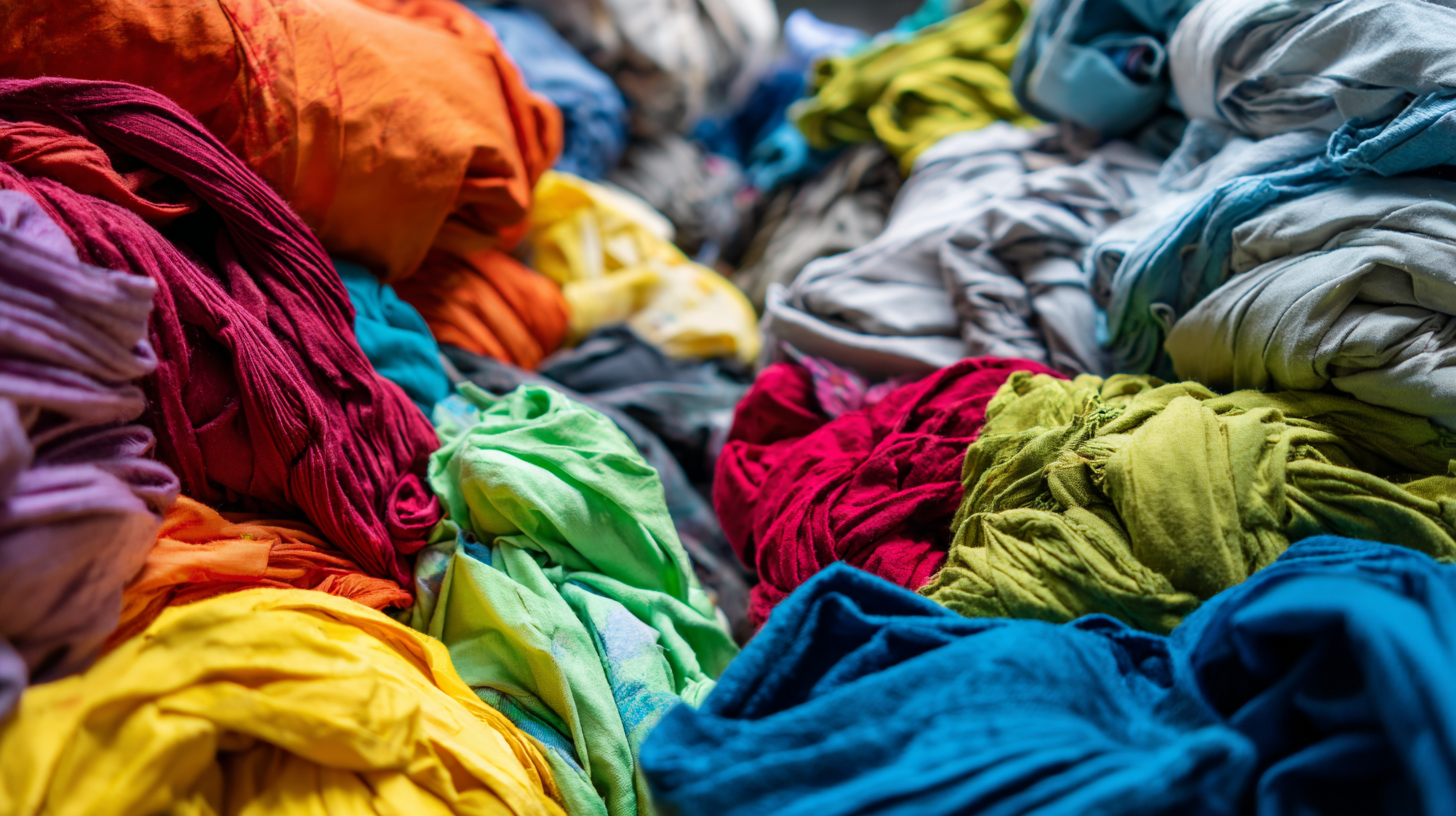As the fashion industry grapples with increasing environmental concerns, the shift towards sustainable materials has never been more critical. Reports indicate that the global recycled nylon market is expected to reach USD 2.3 billion by 2027, growing at a compound annual growth rate (CAGR) of 7.9% from 2020 to 2027. This growth is largely driven by the rising demand for eco-friendly fabrics and the fashion industry's efforts to reduce its carbon footprint. Recycled Nylon Fabric, derived from post-consumer waste such as discarded fishing nets and fabric scraps, presents a viable solution to mitigate plastic waste while supporting sustainable production practices. By transforming waste into high-quality fabric, manufacturers not only contribute to a circular economy but also address consumer demands for responsible fashion. This blog will explore seven compelling reasons why Recycled Nylon Fabric is poised to define the future of sustainable fashion, positioning it as a preferred choice among leading global manufacturing facilities.

In recent years, recycled nylon fabric has emerged as a pivotal player in the sustainable fashion industry, offering a myriad of benefits that align with eco-conscious consumer demands. One of the most significant advantages is the reduction of plastic waste. According to the Global Recycling Foundation, over 300 million tons of plastic are produced each year, with a substantial portion ending up in oceans and landfills. Utilizing recycled nylon, which is derived from discarded fishing nets and other nylon waste, can help divert this material from the environment and reduce pollution by up to 70%, compared to producing virgin nylon.

Additionally, recycled nylon boasts a lower carbon footprint, making it a smart choice for brands aiming to enhance their sustainability practices. A study conducted by the Fashion for Good organization reveals that using recycled nylon can result in up to 80% less water consumption and a significant decrease in greenhouse gas emissions. This innovative fabric not only satisfies the growing consumer appetite for eco-friendly options but also encourages brands to participate in circular economy practices, thus paving the way for a more sustainable future in fashion. By embracing recycled nylon, the industry is taking bold steps toward reducing its environmental impact and promoting responsible production.
Innovative technologies are transforming the landscape of sustainable fashion, particularly through advancements in recycled nylon fabric. As the demand for eco-friendly materials surges, modern processes are enhancing the efficiency of recycling and upcycling plastic waste. By refining polymer technologies, companies can now produce high-quality textiles that not only minimize environmental impact but also maintain the durability and aesthetic appeal that consumers seek.
One key to success in this green revolution is the implementation of circular economy principles. This approach encourages brands to think beyond traditional production methods and instead focus on designing for recyclability. For fashion designers and manufacturers, leveraging innovations like biodegradable plastics or multilayer polymers can significantly reduce waste while fostering a commitment to sustainability.
Tips for brands looking to embrace these innovations include investing in research and development for new material technologies, collaborating with experts in sustainable practices, and participating in expos dedicated to certified sustainable textiles. By prioritizing eco-conscious strategies, the fashion industry can lead the charge toward a more sustainable future, where recycled nylon is not just an alternative but the standard.

In the modern fashion industry, sustainability is no longer a trend but a necessity for brand success. According to a report from McKinsey & Company, the global apparel market is projected to reach $2.25 trillion by 2025, with sustainable fashion gaining a significant share of that market. Consumers are increasingly prioritizing eco-friendly brands, with 66% of global consumers willing to pay more for sustainable products. This shift in consumer mentality highlights why brands must adapt their practices to remain competitive.
Neal and Palmer's analysis in the Journal of Fashion Marketing and Management indicates that brands embracing sustainable materials like recycled nylon not only enhance their environmental standing but also achieve increased customer loyalty. Companies utilizing eco-friendly fabrics report up to a 20% boost in sales compared to those relying solely on conventional textiles.
**Tips:** Incorporating recycled nylon can be a game-changer; not only does it reduce waste, but it also positions your brand as a pioneer in the sustainability movement. Additionally, consider transparency in your supply chain, as consumers appreciate brands that openly share their environmental initiatives. Engaging with your audience on sustainability matters can turn casual buyers into loyal advocates for your brand.
As consumers become more aware of the environmental impact of their purchases, the fashion industry is witnessing a significant shift towards sustainability. According to a report by McKinsey & Company, 67% of consumers consider the use of sustainable materials when making their purchasing decisions. This growing consciousness is not just a trend; it reflects a deeper understanding of the pressing environmental issues caused by fast fashion, such as excessive waste and pollution. The rise in popularity of recycled nylon fabric is a testament to this change, as it offers an eco-friendly alternative without compromising on quality.
In addition, a survey conducted by GlobalWebIndex found that 55% of consumers are actively trying to make more sustainable lifestyle choices, including opting for brands that prioritize environmentally responsible practices. By choosing products made from recycled materials, such as nylon, consumers can significantly reduce their carbon footprint. For instance, the production of recycled nylon reduces energy consumption by up to 80% compared to virgin nylon. This data highlights the critical role consumer awareness and conscious choices play in driving the fashion industry towards sustainable practices, signaling a promising future where eco-friendly fashion becomes the norm.
| Reason | Description | Environmental Impact | Consumer Benefit |
|---|---|---|---|
| Reduced Waste | Recycled nylon helps to divert waste from landfills, contributing to a circular economy. | Decreases landfill overflow | Contributes to a cleaner environment |
| Lower Carbon Footprint | The production of recycled nylon uses significantly less energy than virgin nylon. | Reduces greenhouse gas emissions | Attractive to eco-conscious consumers |
| Water Conservation | Recycled nylon production uses less water compared to standard nylon production. | Contributes to water resource preservation | Supports sustainability efforts |
| Durability | Recycled nylon maintains high durability and performance qualities. | Longevity reduces the need for frequent replacements | Cost-effective for consumers |
| Fashion Versatility | Recycled nylon can be made into various styles and designs. | Encourages creative, sustainable fashion | Allows consumers to express their style sustainably |
| Increasing Availability | More brands are adopting recycled nylon, making it widely available. | Supports a shift towards sustainable materials | More options for conscious consumers |
| Consumer Awareness | Increased education on sustainable products influences purchasing decisions. | Promotes a green consumer culture | Empowers consumers to make informed choices |
As the fashion industry continues to grapple with its environmental impact, recycled nylon emerges as a promising solution in the realm of sustainable fashion. One key prediction for the future is the increased integration of recycled materials into mainstream collections. Brands are recognizing the demand for sustainable practices, and recycled nylon offers a way to reduce waste while maintaining quality. With advancements in recycling technology, designers can transform post-consumer waste into high-performance fabrics, catering to eco-conscious consumers without compromising style or durability.
Another trend is the rise of circular fashion, where recycled nylon plays a crucial role in creating a closed-loop system. By utilizing materials that can be continuously recycled, brands not only minimize their environmental footprint but also foster a culture of sustainability. Future innovations may include improved collection systems and more efficient recycling processes, allowing for greater accessibility and adoption of recycled nylon. As consumer awareness grows, the shift towards sustainable materials like recycled nylon is likely to gain momentum, reshaping the landscape of fashion towards a more eco-friendly future.
